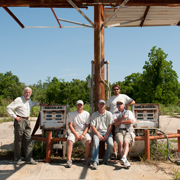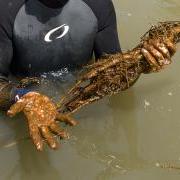The Gulf of Mexico is the beating heartbeat of the American south,
supporting fisheries, tourism and recreation, and a vibrant and diverse ecosystem –
all of which came under siege when the Deepwater Horizon
exploded on April 20th, 2010 in the largest environmental oil spill in history
supporting fisheries, tourism and recreation, and a vibrant and diverse ecosystem –
all of which came under siege when the Deepwater Horizon
exploded on April 20th, 2010 in the largest environmental oil spill in history

The Gulf of Mexico is an ocean basin largely surrounded by the North American continent and supports some of the largest fisheries in the world. Nearly half of the entire basin consists of shallow waters, allowing life to thrive as sunlight penetrates the shallow continual shelves. Where the Gulf meets the land, massive salt marshes provide nursery habitats for fish and other animals and serve a vital role in protecting the coastline from storms and erosion.
The Gulf coast spans a range of habitats, including submerged vegetation, coastal shelves, open oceans, and 28 percent of salt marsh wetlands in the United States. Important fisheries include red snapper, swordfish, grouper, shrimp, crab and oyster. The region is home to 29 species of marine mammals – like bottlenose dolphins, humpback whales, and sperm whales – all five species of endangered sea turtles, 49 shark species and millions of migrating sea birds, and countless numbers of fishes and invertebrates.
When the Deepwater Horizon oilrig exploded on April 20, 2010, the Gulf was bombarded with oil and dispersants on an unprecedented level. Eleven workers lost their lives, and crude oil gushed from the spewing wellhead over 86 days, spilling 3.19 million barrels of oil into the Gulf of Mexico and an additional 1.8 million gallons of toxic dispersants – making it the largest toxic experiment ever conducted on a body of water. Five years later, oil and dispersants remain in the Gulf of Mexico as residents continue to clean up beaches, wildlife, and their homes.
Other threats to the Gulf of Mexico include human impacts from agricultural runoff, which create plankton blooms and die-offs that deplete oxygen levels and cause “Dead Zones,” where little to no life can survive.
State of the Gulf
- The Deepwater Horizon oil spill continues to impact the environment, economy, and livelihoods of those residing near the Gulf – learn more about The Deepwater Horizon Oil Spill: Five-Year Aftermath
- Millions of gallons of Corexit, a toxic dispersant, was added to the spill to hide the oil slick at the surface and is now causing major health problems for residents, clean up workers and wildlife species in the Gulf
- A snow-like mix of mucus, oil residue and phytoplankton is still covering 1,200 square miles of the Gulf's floor
- 41 percent of the contiguous United States drains into the Mississippi River, which then drains into the Gulf, bringing significant pollution and runoff
- The Gulf contains the second largest dead zone in the world, found to be roughly the size of Connecticut during a study 2014
- The cost of the Gulf of Mexico oil spill has been an estimated $14 billion on cleanup – imagine what that money might have done to move us forward in ocean exploration, renewable energy initiatives and environmental education for the youth
- Watch videos from the field
- Watch Jean-Michel Cousteau’s video statement: Gulf Oil Disaster
- Watch Jean-Michel Cousteau’s Public Service Announcement: Florida Oil Drilling
- See how the OFS team did their part in carbon-off setting during their expedition to the Gulf in 2010
- Learn how YOU CAN HELP!
- The Gulf steam – which originates in the warm waters of the Gulf of Mexico, is one of the strongest currents in the world
- The Gulf provides 80% of U.S. oysters, 69% of shrimp, and 26% of the nations blue crab
- The Gulf has eight of the top twenty fishing ports in the nation by dollar value
- Over 33 major river systems from across North American empty into the Gulf
 Gulf of Mexico Expedition Team |
 Videos from the Gulf of Mexico |
Learn more about our work in the Gulf

Quick Facts
Support Ocean Futures Society!
We rely on your support to help us be a Voice for the Ocean. By becoming a member, donating, or taking part in our Action Alerts, you help us spread our message, “Protect the Ocean, and you protect yourself, and future generations to come.”
Exploration
Donate to Two Futures Society
Yes! I want to support the field work, projects and mission of Jean-Michel Cousteau and the OFS team. Make a tax-deductible donation now!
Become a Member
Yes! Sign me up for a free membership!

Connect With Us